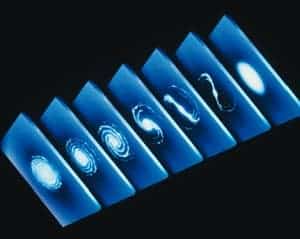The Infinite Cosmos: Questions from the Frontiers of Cosmology
Joseph Silk
2006 Oxford University Press
256pp £18.99/$29.95 hb

Cosmologists face a dilemma. The rise of quantitative cosmology, exemplified by the release of new data in March on the cosmic microwave background from the WMAP satellite (see pp16-19; print version only), threatens to make cosmology a real science at last. But underconstrained speculation is so much fun, as is dodgy philosophy, and both undoubtedly played a major role in attracting today’s practitioners into the art. So what is one to do?
Extending the subject’s bounds well beyond its previous horizons is not a bad start, and there are several serious attempts to keep cosmology speculative. String theory is perhaps not a bad try, wormholes a little more desperate and the overenthusiastic application of the anthropic principle is something of a mini-industry. The rather superficial consideration of infinities and their possible consequences, as well as the introduction of quasi-religious terminology, perhaps go beyond fun into risking intellectual respectability.
Cosmology, the study of the universe writ large, is after all a serious science with a respectable (recent) history of major discovery and some limited explanation. Just a century ago there was no appreciation of the vast size of the universe – though it was well understood to be very old. Its expansion was unknown, the concept of a single origin in the Big Bang was rash pseudo-creationism, and the idea that one could directly observe photons generated when the universe was less than 1% of its present age was absurd. In those days, terms such as dark matter and dark energy would have conjured up images of coalminers rather than philosophers. Developing our current model of cosmology was one of the greatest intellectual achievements of the 20th century – a period in which rather a lot of stunning advances vie for that honour.
The story is well known, though it bears retelling for each new generation. Indeed, the first part of this fascinating and frustrating new book by the distinguished cosmologist Joseph Silk is a rather standard run through the history of modern cosmology. Some parts are superb, in particular the explanation of the meaning of the cosmic microwave background – not surprising, given the major contributions to the subject made by the author. Other parts, especially the description of the consequences of the microwave-background polarization results from WMAP, have already been overtaken by new data, reminding us that precision cosmology is a work in progress – still under development and only part robust science.
Even if the content is familiar, Silk does have an excellent style: he cleverly mixes the basic science with anecdotes about the personalities involved, and is not afraid to make his opinions and criticisms clear. Readers will enjoy a superb description of the abuse of science by the PR departments of major labs; an abuse being re-enacted today as credit for the “discovery” of dark energy, in fact a culmination of half a century of work started by Edwin Hubble and carried forward by Allan Sandage, is claimed by a few latecomers.
Some readers may wish to rush through the introductory overview and get on to the main course. Here Silk adequately introduces some of the more unusual concepts used in modern physics and cosmology, and makes a quick dash through the role of the observer in quantum mechanics. The brief tour of the multiverse is acceptable too, but the really creative and challenging part of the book comes in the now-obligatory philosophical section. Here Silk does substantially better than most of the nonsense served up in recent cosmology books: indeed exposing it as nonsense is something Silk does eloquently and well.
In some of these other recent discussions of the far future and multiverses, one can find statements such as “other intellectual life is inevitable in an infinite universe” and “in an infinite universe eventually everything will happen”. This, without qualification, is nonsense: I can readily imagine an infinite static universe that is infinitely empty, in which infinitely nothing will eventually happen. It is simple to imagine what the authors of such statements intend, but the point of philosophy is intellectual and literary exactness – otherwise such ideas are speculative rubbish.
As another example, it is now a mere truism that scientists abuse the name of God in populist books. In addition to betraying a depressing lack of literary inventiveness, such use of emotionally charged and complex-valued terminology confuses and abuses the trust of the non-expert public. Here Silk rises above such limits, providing a clear and interesting commentary, pulling no punches, and naming names of some of the most egregious offenders. Scientists have no right to smug contentedness when exposing sham, such as through the Sokal “hoax”, if our own community exploits the same mix of gullibility and obscurity. The author’s comments on this issue are trenchant and thoughtful.
Silk raises many interesting ideas in the book, albeit almost all only in passing in a style and at a depth that is more along the lines of a dinner-table conversation between academics than a deep analysis. There is enough here, however, to introduce the reader to the subject of modern cosmology and to the more interesting philosophical ideas that arise in that study. The style and level are appropriate to allow interested readers to start to think more deeply for themselves about these complex and fascinating concepts.



